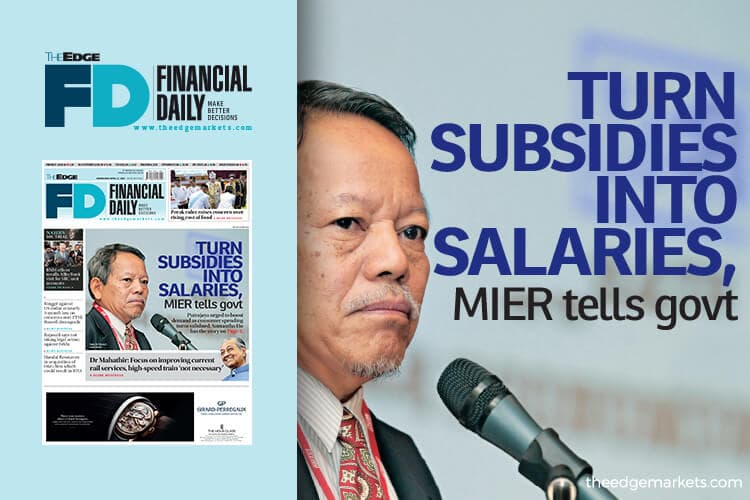
This article first appeared in The Edge Financial Daily on April 17, 2019
KUALA LUMPUR: Instead of fixating on price levels when it comes to addressing the high cost of living, the government should instead focus on boosting salaries, according to the Malaysian Institute of Economic Research (MIER).
“My suggestion is that the government transform subsidies into salaries — change [subsidies] into a real increase in salaries and wages,” said MIER executive director Datuk Dr Zakariah Abdul Rashid.
“If we increase the salaries of the public sector, the private sector will have to improve,” he told reporters on the sidelines of MIER’s 24th Corporate Economic Briefing yesterday.
The time is right for the government to implement policies that would boost aggregate demand, primarily via private consumption, as it has been Malaysia’s economic driving force for many months now, he said.
This is especially because consumer spending has become increasingly subdued, based on monetary data from the first quarter of 2019 and MIER’s own surveys.
In particular, MIER noted that money growth declined in the first two months of 2019, while loans approved and disbursed also declined to more than eight-month lows during the same period.
Zakariah highlighted that MIER’s own leading indicators, the Consumer Sentiment Index (CSI) and Business Sentiment Index (BSI), both contracted further below the 100-point optimism threshold for the second quarter of 2019. The CSI was down to 85.6 points while the BSI slid to 94.3 points.
“Spending plans are uninspiring,” Zakariah said in his presentation.
Minimum wage revision ‘not enough’
Policies such as upward revision in minimum wage, while positive, are “not enough”, he said.
“Previously, we were afraid to increase salaries because prices would go up. But an increase in prices will stimulate effective demand because it gives people an incentive to work,” Zakariah explained.
“Employers won’t like it, but that is the way forward. A high wage economy requires a structural change,” he said.
Zakariah suggested that the government start focusing on income policy instead of just fiscal and monetary policies, both of which are relatively restricted currently, due to the respective tight federal budget and Bank Negara Malaysia’s consideration of global monetary factors.
Still, both Zakariah and MIER senior research fellow Dr Zulkiply Omar stressed that increases in wages are not an overnight goal.
“You cannot increase income overnight. One of the ways to increase productivity is to see income increase. Then, if prices increase a little bit, it doesn’t matter. But now, we are very sensitive to price [increases] because income is too low,” Zulkiply told The Edge Financial Daily.
Zakariah is also of the opinion that there is a need for manufacturers and businesses to remove obsolete technology, an outcome that usually comes hand in hand with higher wages.
“If you increase income, it forces manufacturers to be more capital-intensive. They won’t be able to use many unskilled workers any more because each person becomes very expensive.
“It forces employers to cut down [the number of] employees and to use machines. That means the old machines become obsolete because the [labour] cost increases. That, to me, is the way forward to increase productivity,” Zakariah said.
He also highlighted that the labour share of Malaysia’s gross domestic product (GDP), at 35.2% in 2017, is too low when compared with the over 40% labour-to-GDP ratios seen in high-income Organisation for Economic Co-operation and Development countries.
“In fact, the ministry of economic affairs has revised downwards the target to 38.5% [from 40%] by 2020. At the end of the day, we have to empower the people to earn real income through higher productivity. That is the main issue,” Zakariah added.